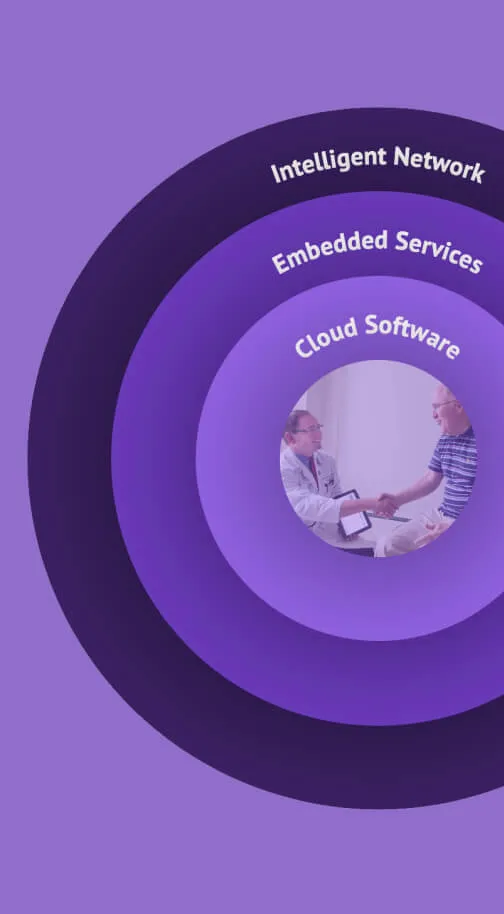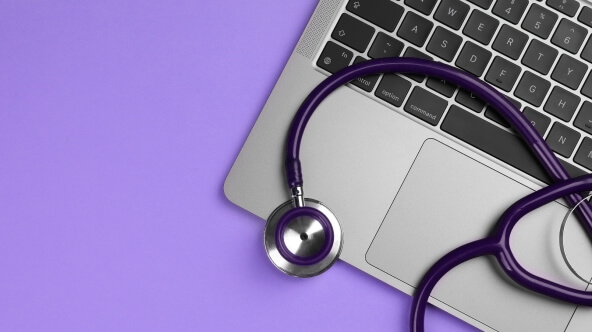What protections should you expect from a trusted HIT partner?
If you’re exploring new health IT options after hearing about another cybersecurity breach or service disruption, you’re not alone. Providers across the country are rethinking their systems, not just because of increasing threats, but because the consequences of failure are too great to ignore. Your patients count on uninterrupted, safe care. Your staff relies on technology that works when it’s needed most. Your business must continue processing payments and posting claims if you’re to stay afloat.
At athenahealth, we understand that your practice is built on trust and reliability. That’s why athenaOne® is designed with security and resilience at its core. We don’t see cybersecurity as a box to check. It’s something we proactively invest in to protect your data, your operations, and your peace of mind.
Why cybersecurity matters to healthcare practices more than ever
Sadly, healthcare organizations are frequent targets for cyberattacks, simply due to the wealth of information that can potentially be obtained and the fact that payment information is often part of a healthcare visit. When something goes wrong, the impact can be felt immediately, not just on systems, but on care delivery.
- Sensitive data protection: Patient information is highly personal and highly valuable to attackers. If it’s stolen from your EHR system, it can be used for identity theft, financial fraud, or even to manipulate treatment decisions.
- Patient safety: As medical devices and care platforms become more connected, cyberattacks can interfere directly with patient care, compromising devices, delaying procedures, or disrupting medications.
- Continuity of operations: Healthcare runs on data. If your records, scheduling, or billing systems go down, so does your ability to care for patients efficiently or safely.
- Compliance and trust: A breach doesn’t just risk regulatory penalties. It can also erode the confidence your patients have in your practice, and the trust your team places in your tools.
With athenaOne, you also get a platform that’s been proven for more than 25 years, supporting over 160,000 providers nationwide, processing 315 million annual claims, and supporting more than 72 million patients.
Common threats that healthcare practices face
Many practices today are more vulnerable to cybersecurity risk because of issues that aren’t always visible—until something goes wrong. These include:
- Legacy systems that lack up-to-date security protections: Older software and hardware often can’t defend against modern cyber threats, making them easier for attackers to exploit through unpatched vulnerabilities or outdated protocols.
- Ransomware attacks that encrypt your data and demand a payment to restore access: Often arising from an innocuous-looking email sent to a staff member or a malicious ad, these attacks can bring clinical operations to a halt, locking you out of essential tools and records when patients need them most.
- Limited internal resources, especially in smaller practices, making it harder to keep pace with evolving threats: Without dedicated IT or cybersecurity staff, many practices struggle to monitor, prevent, or respond effectively to attacks, especially if they’re managing on-premise systems themselves.
- Third-party exposure as more services and data are shared with additional vendors: Your practice may be secure, but if your partners—and their partners—aren’t, your data may still be at risk, especially if integrations are complex or loosely managed.
- Insider threats, both accidental and malicious, that can lead to data leaks: From mis-clicks to misuse of credentials, insiders often present overlooked risks that can compromise data and disrupt care.
What reliable protection looks like with athenaOne
athenaOne brings the scale, sophistication, and specialization needed to keep your data—and your operations—safe. Here’s what you can expect from our approach:
Real-time network monitoring for early threat detection and rapid response
We continuously scan for vulnerabilities and signs of attack, allowing us to act quickly and limit exposure if a threat emerges. With visibility across thousands of providers, we can identify trends early and apply learnings quickly to strengthen defenses.
Specialized security teams in threat and risk management, engineering, security software development, cloud security, and operations
Our security experts work across every layer of the system to embed protections throughout our platform.
HITRUST certification, maintained continuously since 2013
This certification reflects our long-standing commitment to the highest standards in healthcare security, privacy, and risk management.1
Multi-factor authentication for all users
All athenaOne users are required to enable multi-factor authentication (MFA) or Single Sign-On (SSO) to protect against cybersecurity incidents and breaches into protected health information (PHI).
athenaOne security is built into the software, not bolted on
We don’t treat cybersecurity as a one-time project. It’s an ongoing, embedded part of how we operate and evolve athenaOne and align with the industry’s most rigorous frameworks and regulations. These include:
HIPAA technical safeguards, including encryption and access auditing
These controls ensure that only authorized users can access patient data and that critical activities are logged and traceable.
HITECH breach notification and electronic record protections
Our breach response protocols and data handling practices meet strict standards, ensuring transparency and accountability.
NIST Cybersecurity Framework guidance for risk management and control implementation
We follow a structured, nationally recognized approach to identifying, preventing, and responding to security threats.
Choosing a HIT partner you can rely on for cybersecurity
Cybersecurity is just one piece of what makes a technology partner dependable. With athenaOne, you also get a platform that’s been proven for more than 25 years, assisting over 160,000 providers nationwide,2 processing 315 million annual claims,3 and supporting more than 72 million patients.4
And if something ever does go wrong, we’re right there with you. Our experts are available to support you with urgency, transparency, and accountability, whenever you need us. All athenaOne customers have a dedicated Customer Success Manager—a real human being they can contact for assistance, as well as access to our Customer Service team. If something more serious happens, athenahealth is equipped to mobilize and respond quickly to mitigate the potential harm.
To further protect our athenaOne customers and reduce exposure to cyber risks, we’ve moved away from reliance on third-party exchanges and instead built secure, direct connections between providers and payers. This limits risk and increases control.
Supporting your practice, so you can support your patients
You didn’t go into medicine to worry about ransomware, compliance audits, or outdated servers. You want to care for your patients with confidence. That’s our mission, too. We handle the complexity of cybersecurity and reliability so you don’t have to—giving you more time and peace of mind to focus on what matters most.
If you’re rethinking your current HIT solution and EHR software, we’d welcome the opportunity to connect and show you what trusted technology really looks like.
1. HITRUST, HITRUST CSF — Our Cybersecurity Framework; https://hitrustalliance.net/hitrust-framework
2. Based on athenahealth data as of Dec. 2024; M010
3. Based on athenahealth data for 12 months ending Dec. 2024; M016
4. Based on athenahealth data for 12 months ending Dec. 2024; M225












